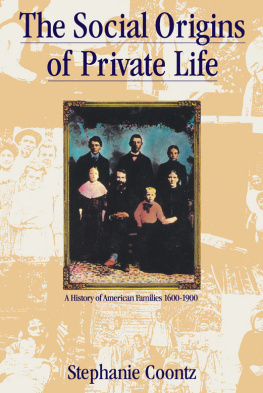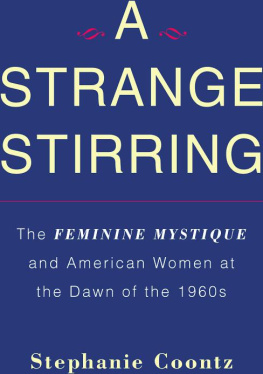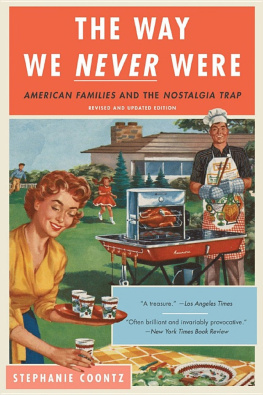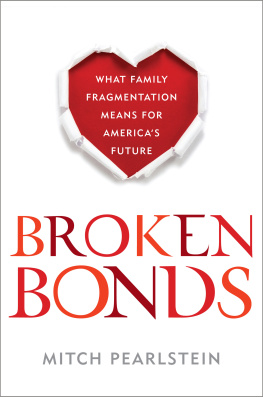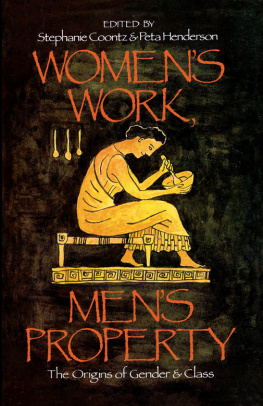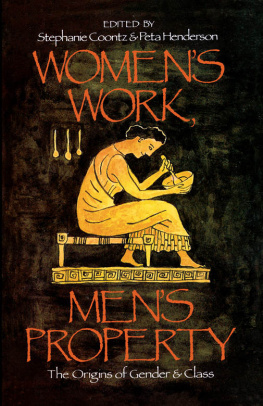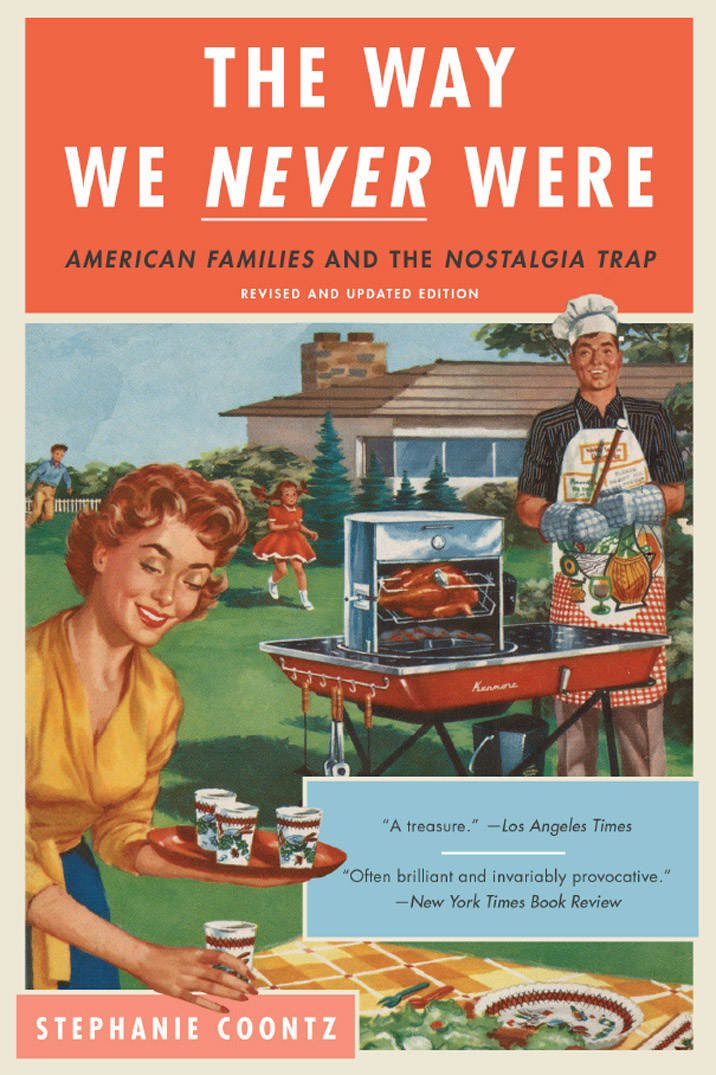Praise for The Way We Never Were
More than twenty years ago, in The Way We Never Were, Stephanie Coontz cut through all the bizarre stereotypes we carry with us about marriage and the family in America. Now, in a brilliant revision, she jolts us once again by bringing us up to date on when people marry, how income inequality affects family life, and why we have made so much progress on issues of gay marriage and so little on issues of poverty and womens reproductive rights. A terrific read with amazing new information!
WILLIAM H. CHAFE, Alice Mary Baldwin Professor of History, Duke University, and former president, Organization of American Historians
Coontz presents fascinating facts and figures that explode the cherished myths about self-sufficient, happy, moral families.
Newsday
Historically rich, and loaded with anecdotal evidence, The Way We Never Were effectively demolishes the normal, traditional nuclear family as neither normal nor traditional, and not even nuclear.
Nation
A wonderfully perceptive, myth-debunking report.... An important contribution to the current debate on family values.
Publishers Weekly
Clear, incisive, and distinguished by Coontzs personal conviction and by its vast range of cogent examples, including capsule histories of women in the labor force and of black families. Fascinating, persuasive, politically relevant. Kirkus Reviews
This small book has had an outsized influence on the way social scientists think about the recent history of the American family. It remains the starting point for anyone who hopes to understand how contemporary family life came about and where we may be headed in the future.
FRANK FURSTENBERG, emeritus Zellerbach Family Professor of Sociology, University of Pennsylvania
There is no better commentary on the status and processes of American families than The Way We Never Were. Stephanie Coontz writes about the realities of family life in an uncompromising way that integrates evidence-based research with the souls and everyday lives of kin within and across generations and across time and space. In my family sociology courses a spontaneous awakening occurs for students who read this book for the first time. They never look at families the same way, which is a game changer as they consider family life in their futures and question the meaning of families in their present lives. Stephanie Coontz has given the field a true gift that guides us in a journey of understanding the evolution of family life in real time and under real circumstances. Illuminating, provocative, and a must read for all!
LINDA BURTON, dean of social sciences and James B. Duke Professor of Sociology, Duke University
Stephanie Coontz has her finger on the pulse of contemporary families like no one else in America. In this book, she busts numerous myths about families in the past and clearly explains what is going on in todays families.
PAULA ENGLAND, 2015 president, American Sociological Association
A powerful antidote to the misleading myths and misplaced nostalgia that too often dominate discussions of family life, this essential book tells the true history of todays extraordinarily diverse families. Drawing upon the most recent research, the nations foremost historian of marriage explains why family life changed so radically in the course of a single generation, presenting a remarkably balanced perspective on the losses and gains that have accompanied this revolution.
STEVEN MINTZ, professor of history, University of Texas at Austin
Her four-page survey of African American families in U.S. history is a heartbreaking essay in itself. It ought to be required reading for anyone who pontificates on pathology in the black family.
San Francisco Chronicle
[Coontz] persuasively dispels the myths and stereotypes of traditional family values as the product of the postwar era.
Library Journal
Highly instructive reading for any number of political candidates.
Washington Post


Copyright 1992 by Basic Books, a Member of the Perseus Books Group
Introduction and Epilogue to 2016 edition copyright 2016 by Basic Books.
All rights reserved. Printed in the United States of America. No part of this book may be reproduced in any manner whatsoever without written permission except in the case of brief quotations embodied in critical articles and reviews. For information, address Basic Books, 250 West 57th Street, 15th Floor, New York, NY 10107.
Books published by Basic Books are available at special discounts for bulk purchases in the United States by corporations, institutions, and other organizations. For more information, please contact the Special Markets Department at the Perseus Books Group, 2300 Chestnut Street, Suite 200, Philadelphia, PA 19103, or call (800) 810-4145, ext. 5000, or e-mail .
Library of Congress Cataloging-in-Publication Data
Coontz, Stephanie.
The way we never were : American families and the nostalgia trap / Stephanie Coontz.
p. cm.
Includes bibliographical references and index. 1. FamilyUnited StatesHistory20th Century 2. United StatesSocial conditions. 3. Nostalgia. I. Title.
HQ535.C643 1992 91-59009 306.85'097dc20 CIP
978-0-465-09884-2 (2016 e-book)
10 9 8 7 6 5 4 3 2 1
Table of Contents
Guide
Contents
M UCH HAS CHANGED FOR AMERICAN FAMILIES SINCE The Way We Never Were first appeared in 1992. The most dramatic transformation has been the cultural and legal about-face regarding same-sex marriage. The prospect of legalized same-sex marriages seemed far off even when the second edition was published in 2000. As late as 2004, 60 percent of Americans still opposed granting gays and lesbians the right to marry, and in 2013 thirty-five states had laws limiting marriage to heterosexual couples.
Yet by 2014, 138 polls by twenty-one different polling organizations all found majorities supporting marriage equality. Then on June 28, 2015, the U.S. Supreme Court ruled 54 that marriage was a fundamental right and could not be denied to gays and lesbians. Hundreds of thousands of gay and lesbian couples across the country, many raising children, now enjoy full marital and parental rights. Unfortunately, 52 percent of the LGBT population, married and single alike, still live in states where they are subject to job or housing discrimination because of their sexual orientation or gender identity. And legalization of same-sex marriage does not help the disproportionate number of LGBT youth who become homeless after being rejected by their heterosexual parents. Nevertheless, the legalization of same-sex marriage represents a stunning turnaround from the laws and attitudes of the early 1990s.
Other changes reflect the persistence of family trends that were already well established by 1992. Between 1960 and 1990, the average age at first marriage rose from twenty to twenty-four for women and from twenty-two to twenty-six for men. By 2014, it had climbed further to twenty-seven for women and twenty-nine for men. Many more people now delay marriage until their thirties or forties, and some researchers believe that a full quarter of todays young adults may reach their mid-forties to mid-fifties without ever having been married, although unmarried cohabitation has grown more common.


